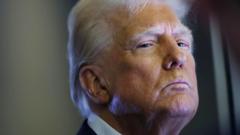In a dramatic resurrection of his presidency, Donald Trump has made a striking return to the White House, showcasing a more confident and organized approach. His recent whirlwind trip from Las Vegas to Miami on Air Force One featured an impromptu Q&A with journalists, a stark contrast from the restrained interactions of his predecessor, Joe Biden.
With Fox News replaced CNN on in-flight screens, Trump expressed his satisfaction with his administration’s initial accomplishments. "We're getting A-pluses on the work done," he remarked, describing the first week as "the most successful" anyone could recall for a newly reelected president.
In a span of just a few days, Trump affirmed significant changes, including the controversial dismissal of independent watchdogs and plans for US territorial ambitions, specifically referencing Greenland. He advocated for Egypt and Jordan to take in more Palestinians while asserting a “very good relationship” with UK Prime Minister Sir Keir Starmer despite their ideological differences.
The dynamics in Washington have undeniably shifted, with Trump's return erasing many of Biden's initiatives almost entirely. In a rapid-fire manner, Trump signed an unprecedented 26 executive orders, far eclipsing Biden's nine in his first week. Historical perspectives have begun to reshape around Trump’s bold narrative, including his recent pardons for over 1,500 supporters from the Capitol riot and provocative moves like renaming the Gulf of Mexico to the Gulf of America.
This new Trump administration is distinctively different, not only with seasoned aides at the helm but also a Congress that leans in his favor, enabling him to wield executive power adeptly. Observers like presidential historian Douglas Brinkley note that Trump's assertive actions show a "wild-eyed self-confidence," likening it to Franklin D. Roosevelt's symbolic moves after the Great Depression.
Moreover, Trump's legal battles and political maneuverings have seemingly fortified his resolve to influence history, as he signs directives aimed at reexamining the actions of federal agencies during Biden's tenure. As advisors have shifted from cautious strategists to unwavering supporters, the approach has become decidedly focused and aggressive.
With stark memories of chaotic early attempts during his first term, Trump's team is seemingly more experienced and ambitious, working quickly to implement longstanding goals, especially concerning immigration issues. Advocates believe lessons learned from past legal struggles will help ensure durability in these reforms.
In summary, Trump's second foray into the Oval Office appears to be marked by renewed vigor and a calculated mission, as he aims to reshape America rapidly — sending a clear message to both followers and critics that his administration is poised to "move fast and break things," reminiscent of the tech industry's mantra. The stakes are high, and the political landscape is ready for upheaval once again as the 2024 election looms.






















